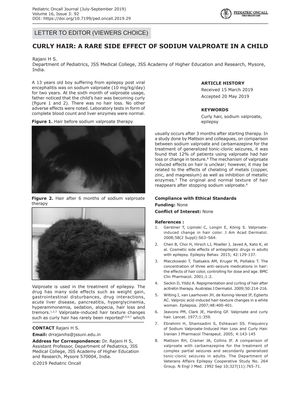TLDR Sodium valproate can rarely cause curly hair in children.
The document discussed a rare side effect of sodium valproate, a drug used to treat epilepsy, which included changes in hair texture, specifically the development of curly hair. While sodium valproate was known to cause various side effects like weight gain, gastrointestinal issues, liver disease, pancreatitis, hyperglycinemia, hyperammonemia, sedation, alopecia, hair loss, and tremors, the occurrence of curly hair had been infrequently reported.
46 citations
,
December 2014 in “Epilepsy & behavior” Some antiepileptic drugs can cause weight gain and hair loss, especially in women.
17 citations
,
January 2008 in “Journal of the American Academy of Dermatology” Valproic acid can cause hair loss, but information on hair color change is not detailed.
 13 citations
,
January 2007 in “Epilepsia”
13 citations
,
January 2007 in “Epilepsia” Valproic acid can cause reversible hair curling and persistent hair thinning.
11 citations
,
January 2018 in “International journal of trichology” Valproate can cause hair loss and changes in hair appearance, but may help regrow hair when applied topically.
 47 citations
,
January 2003 in “American Journal of Clinical Dermatology”
47 citations
,
January 2003 in “American Journal of Clinical Dermatology” Mood stabilizers can cause serious skin reactions; careful monitoring and immediate treatment are crucial.
3 citations
,
November 2019 in “Clinical psychopharmacology and neuroscience/Clinical Psychopharmacology and Neuroscience” Valproate can cause both hair loss and curly hair in bipolar disorder patients.
 63 citations
,
March 2000 in “Annals of clinical psychiatry”
63 citations
,
March 2000 in “Annals of clinical psychiatry” Some psychiatric medications can cause hair loss, but it usually grows back after adjusting the medication.
 3 citations
,
June 2023 in “Medicines”
3 citations
,
June 2023 in “Medicines” Some antiseizure medications can cause reversible hair loss, with valproate, lamotrigine, and carbamazepine being the most common.
 July 2018 in “Elsevier eBooks”
July 2018 in “Elsevier eBooks” Some drugs can cause reversible hair loss, but certain chemotherapy drugs may lead to permanent hair loss; drugs can also change hair color and texture.





